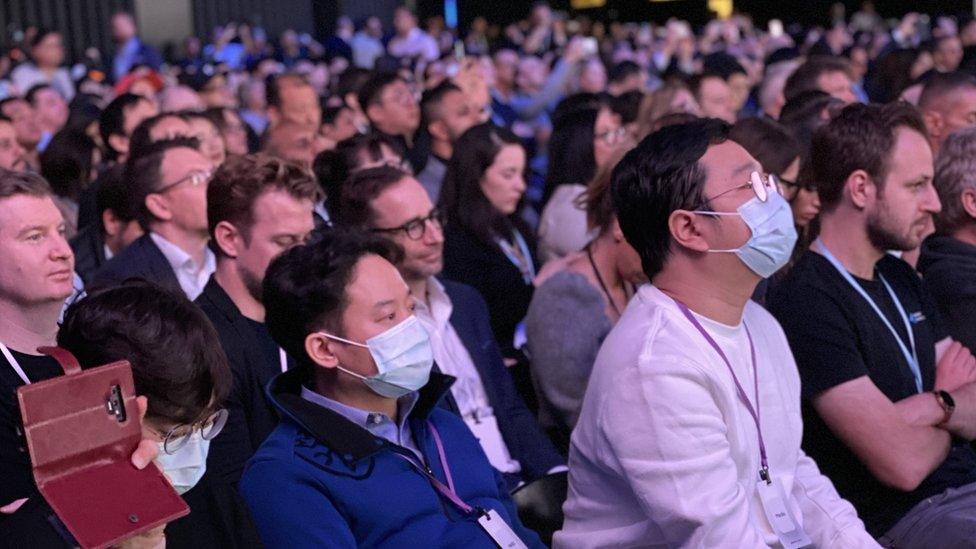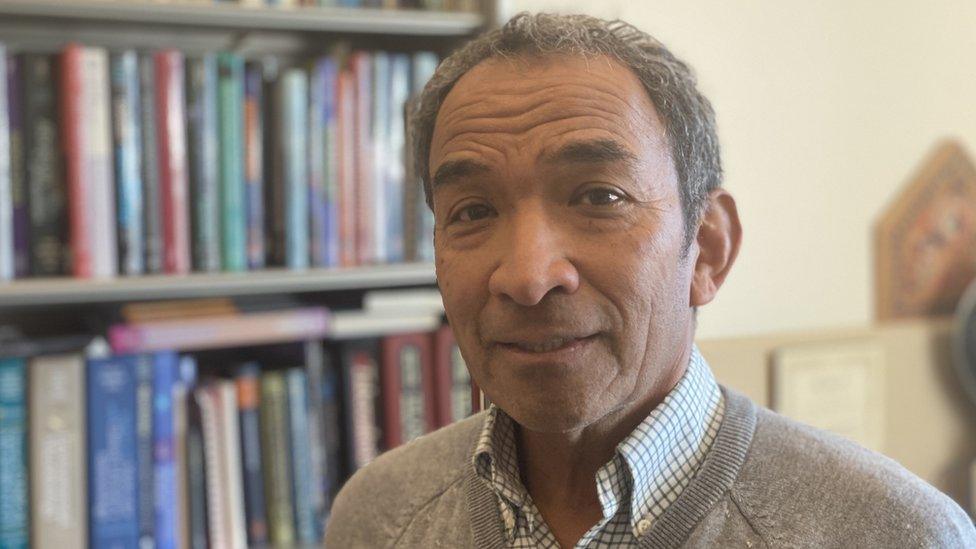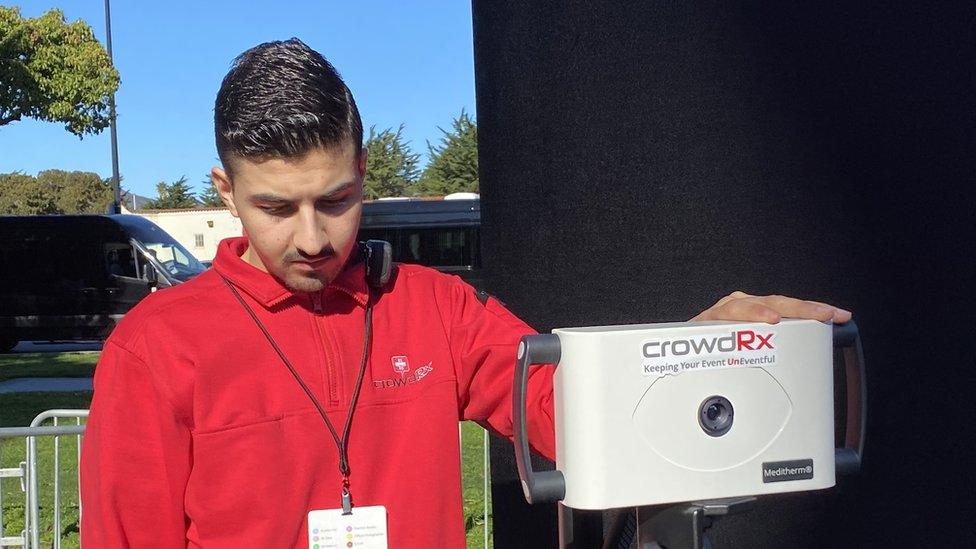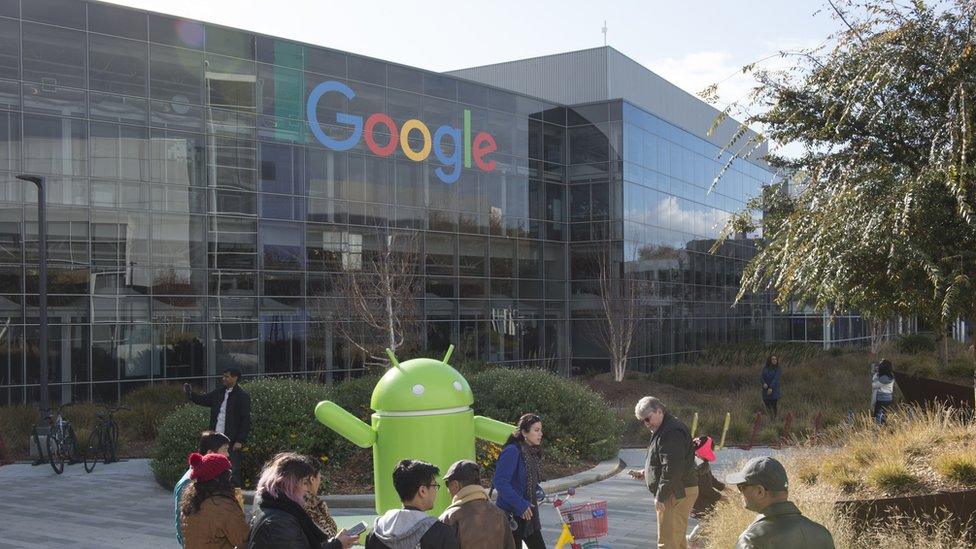Tech Tent: Is social media spreading the virus?
- Published

Even at the Samsung event in San Francisco, the coronavirus loomed large
It was the week when the mobile phone industry's biggest annual trade show was called off over fears about the spread of the coronavirus.
On the Tech Tent podcast this week, we look at the fallout from the cancellation of Mobile World Congress - and ask whether social media has played a positive or negative role in helping people understand the threat posed by the virus.


We've been in California this week - the podcast was recorded from the studios of KQED in San Francisco - and we've watched as the tech industry here has tried to get to grips with the threat posed by the coronavirus.
At the beginning of the week, while major players like Ericsson and LG had pulled out of MWC, the general mood seemed to be that the show would go ahead.
We took a trip across the Bay Bridge to Berkeley in search of some expertise.
Fear spreads faster than infection
There we found Dr Lee Riley, professor of infectious diseases and vaccinology at the University of California - a man who has spent his career studying epidemics, including a spell at the World Health Organization.
He was surprisingly sanguine about the coronavirus, pointing out that common-or-garden influenza was far more deadly, though he said he understood that uncertainty about the nature of the disease was bound to make people fearful.

Constant updates on the virus "feed into some of the anxiety"
But he said a 24/7 news culture and the rise of social media made that fear spread faster than the virus itself - especially as the coronavirus was being diagnosed far more rapidly than Sars was 20 years ago.
"They do the diagnosis, and then we hear about the news of the diagnosis right away throughout the world instantaneously. They're constantly getting updates on this... and I think that feeds into some of the anxiety that people have."
Social media was giving people partial information, but not all the facts, and that magnified their concerns.
He seemed surprised when we told him there was talk of cancelling Mobile World Congress. He said that would be an "over-reaction". Even if people were attending the show from China, he said, "we have new ways to diagnose these types of infections very quickly and accurately so that shouldn't be a concern."
Feeling the heat at Samsung
The following day, the mobile industry's market leader Samsung was launching its latest devices in San Francisco.
On our way into the event – which, like MWC, had attracted visitors from around the world – we had to walk past a temperature sensor to screen us for fever, a symptom of the coronavirus.
Inside, there were plentiful supplies of face masks and hand sanitiser.

Temperature sensors like this one a the Samsung event are being used across the globe
Then we got to see a spectacular show where the flagship Galaxy S20, now with 5G across all its versions, was unveiled.
Having been under pressure from China's Huawei, which seemed to be leading the way on camera innovation, Samsung showed off a combined optical and digital 100x zoom which allowed the phone to pick out the Palace of Fine Arts where the event was taking place from a vantage point miles away, overlooking the Golden Gate Bridge.
The star of the show, however, was Samsung's second folding phone the Galaxy Z Flip, a smaller and far more elegant device than last year's Galaxy Fold, even though the $1,380 (£1,058) price tag seems a bit steep just to be able to slip it into your jeans pocket.
WATCH: Rory Cellan-Jones and Zoe Thomas puzzle out the Z Flip phone
This was the second time Samsung had held its major event of the year before Mobile World Congress, previously the launch pad for its new Galaxy phones.
Disappointment and disinformation
That move looked even smarter the next day, when the news came through that MWC had been cancelled. That leaves its biggest Android rival Huawei with no venue to show off its latest devices - it had been planning to make a big splash in Barcelona.
The leading analyst Carolina Milanesi of Creative Strategies, who is based in Silicon Valley, told us she was disappointed to be missing the show – an opportunity to get a global perspective on the industry.
She made the point that a lot of the action takes place behind the scenes, with senior executives meeting and making deals. But the impact on the industry of cancelling the show was as nothing compared to the wider damage the virus could cause.
"It is nowhere near the impact that the coronavirus could actually have from a manufacturing perspective, from delaying products to lack of availability of products that are already in the market today," she said.
Meanwhile, a World Health Organization official has been visiting the Silicon Valley tech giants this week to express concerns over the spread of misinformation about the coronavirus on social media.
Standing outside Google's Mountain View headquarters, Andrew Pattison had this warning: "The spread of misinformation, and false information about the virus itself is spread faster than the virus, and it's got into more people's lives and infected more people than the actual virus itself."

Mountain View, California - home to Google HQ
Examples include people falsely claiming that eating garlic or taking vitamin C could ward off the disease, or changing credible websites such as that of the Canadian Health Ministry to insert false information about schools which had been affected by the coronavirus.
But Mr Pattinson said there had been useful conversations with the tech firms, and Google had acted to remove misinformation from search results about the virus and replace it with content from reliable organisations such as the WHO.
What is clear is that the coronavirus is going to have a major impact on many technology firms this year. Some will be trying to work out how to keep fragile supply chains intact as components from China become sparse.
For others – notably the social media giants – the threat is of damage to their reputations if they are seen as the purveyors of panic and the channels for misinformation.
